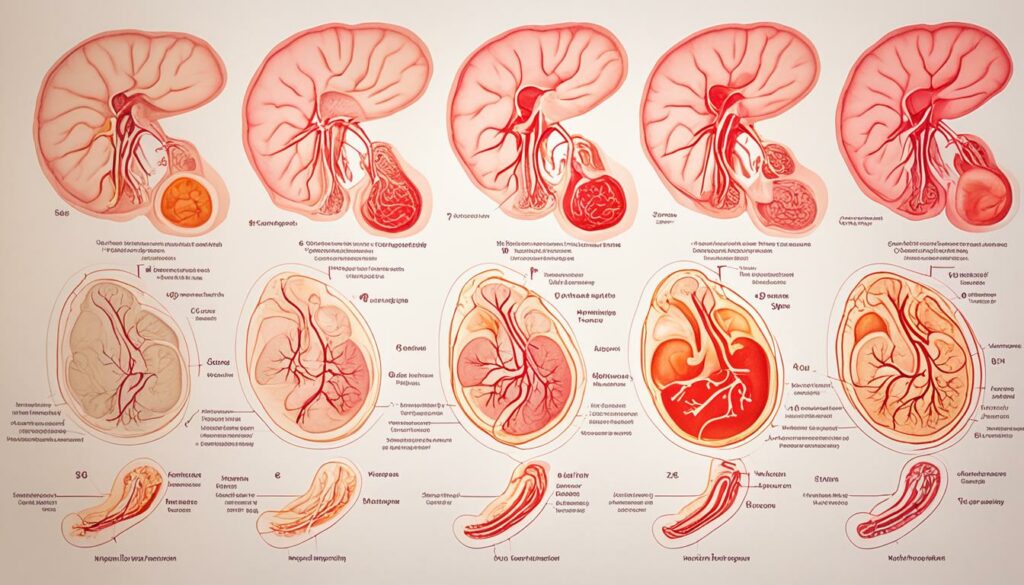Did you know that in the first trimester of pregnancy, your baby undergoes rapid growth? Starting at just 0.64 cm (.25 in), they can reach up to 10 cm (4 in) by the 12th week. That’s incredibly fast! 1
The first trimester is a key time in your pregnancy. Your body changes a lot to nurture the new life within. Taking care of yourself is very important, both in body and mind.
You might face some symptoms like sore breasts, mood swings, morning sickness, and more. These are all normal, though they can be tough.1Don’t stress, there are ways to handle them.
A missed period is a sign you might be pregnant if your cycle is usually regular. Spotting, known as implantation bleeding, might also happen.2If you think you could be pregnant, seeing a healthcare provider is a good step.
To ease first trimester symptoms, try ginger or chamomile and vitamin B6 for nausea. For leg cramps, magnesium or calcium could help. Eating fiber helps with constipation.1Always check with your healthcare provider before trying new remedies.
Getting regular prenatal care in the first trimester is a must. Aim for at least one appointment in the first 12 weeks.3These visits are great for discussing your pregnancy, raising any worries, and getting advice.
Most first trimester symptoms are normal, but some signs need quick action.1If you have severe pain, high fever, smelly discharge, trouble peeing, bleeding, or bad vomiting, call your healthcare provider right away.
Key Takeaways:
- During the first trimester, your baby undergoes rapid growth and development.
- Common symptoms of the first trimester include breast tenderness, morning sickness, fatigue, and frequent urination.
- Self-care tips like ginger, chamomile, and vitamin B6 can help manage nausea or vomiting.
- Prenatal care is important, and scheduling early appointments with your healthcare provider is recommended.
- Stay vigilant for red flags like severe cramping, fever, odorous discharge, or vaginal bleeding and contact your healthcare provider if you experience these symptoms.
Understanding Trimester 1: Early Signs and Symptoms
Trimester 1 marks the beginning of your pregnancy journey. It’s a time to be aware of the changes in your body. Knowing the early signs of pregnancy helps you understand what’s happening.
A missed period is a clear signal you might be pregnant. If your cycle is regular and you miss a period, consider a pregnancy test.
Some women see light bleeding, known as implantation bleeding. It happens when the fertilized egg attaches to the uterus. Seeing unusual bleeding means you should talk to a doctor, to make sure all is well2.
Early pregnancy brings various symptoms. You might feel tired, sick in the morning, or need to use the bathroom often. Sore breasts, mood swings, and more can also occur.
Each pregnancy is different. Not everyone has the same symptoms or feels them as strongly. If you’re worried about any symptoms, getting advice from your healthcare provider is a smart move.
https://www.youtube.com/watch?v=8312a32dcQc
How Your Baby Develops During Trimester 1
Trimester 1 is crucial for your baby’s growth. In this phase, the baby’s core systems and organs start forming. The brain and spine begin to take shape, playing a key role in the baby’s development. This stage lays down the groundwork for the baby’s future growth4.
The baby’s tiny organs also begin to grow. The heart’s tissue forms early and strengthens daily4. The liver, kidneys, pancreas, and digestive system are also taking shape4. These organs are essential for the baby’s health.
During this time, your baby’s genitals start developing too5. Although you can’t see the gender through ultrasound yet, the process of sexual differentiation is happening5. It’s amazing to see how much your baby grows even in these early weeks.
By the end of Trimester 1, the baby has grown a lot. On average, a baby weighs about 0.5 to 1 ounce and is 3 to 4 inches long4. It’s astounding how much development happens in a few months!
Remember, every baby grows at their own speed. These are just averages. It’s vital to eat well to help your baby grow during this important time. A nourishing diet aids in your baby’s development4.

Trimester 1 is a pivotal time for your baby’s development. From creating the brain and spine to growing organs and the initial surge in growth, a lot happens. Cherish this time and ensure you get the right care and nutrition4.
When to Schedule Appointments in Trimester 1
In the first trimester, scheduling appointments with your healthcare provider is key. You’ll get the prenatal care you need. And you can talk about any worries or questions you might have.
Prenatal visits are usually set for every four weeks early on6. This helps your doctor keep an eye on both your and your baby’s health. But the number of visits might change based on your specific health and what your doctor advises.
Your first appointment is pretty important and lasts about 45 minutes6. It’s when you’ll talk about your health history, lifestyle, and any ongoing health issues. This is your chance to give info and get advice that fits your needs.
Later visits in the first trimester are shorter, around 10 to 15 minutes6. These check-ups focus on your health, weight, blood pressure, and any new symptoms or concerns.
The first trimester has key moments for you and your baby. Between 11 and 13 weeks, you’ll likely have an ultrasound for nuchal translucency screening6. This tests for potential chromosomal issues in the baby. Also, you’ll talk about genetic testing options between 7 and 12 weeks6.
Getting good prenatal care in the first trimester is crucial. It prepares you for the next steps. In the second trimester, you’ll see your doctor every four weeks7. These visits check on your and your baby’s health. Around the 20th week, you’ll have an ultrasound to see the baby’s anatomy and perhaps learn the gender6.
In the last trimester, you’ll go to the doctor more often. First, it’s every two weeks until the 36th week. Then, it’s every week until the baby arrives6. These visits are crucial for checking your progress and dealing with any last-minute questions.
It’s very important to start scheduling your appointments early in the first trimester. This ensures you get all the necessary prenatal care. Talk to your healthcare provider or check with your local health ministry for advice on appointments and care.
Remember, being active in your healthcare and keeping up with prenatal appointments sets the stage for a healthy pregnancy.
Managing Trimester 1 Symptoms and Self-Care
The first trimester of pregnancy comes with various symptoms. These may need self-care and management. Knowing how to ease discomfort ensures a more enjoyable experience.
Nausea Relief
Many experience nausea or vomiting in the early weeks, often called morning sickness. To ease this, consider natural remedies. Ginger, chamomile tea, and vitamin B6 can reduce nausea1. Acupuncture could be beneficial too. These methods offer relief without medicine.
Leg Cramps Relief
Leg cramps are common, especially late in the first trimester. Magnesium or calcium supplements might ease the pain1. Talk to your healthcare provider about the safe dosage.
Constipation Relief
Constipation is another issue in Trimester 1. To help, increase your fiber intake as advised by your healthcare provider1. If needed, fiber supplements might be suggested to help you stay regular.
It’s important to check with your healthcare provider before starting any remedies or supplements. They can confirm if these are safe for your situation.

Handling symptoms in the first trimester is key for a better pregnancy. Natural remedies like ginger and chamomile tea help with nausea without meds. For leg cramps, magnesium or calcium supplements are helpful. For constipation, eat more fiber or consider supplements. Always create a care plan with your healthcare provider.
What to Expect in Trimester 1: Emotional and Physical Changes
Trimester 1 of pregnancy is an amazing time filled with lots of changes. Your body starts getting ready to support and grow a new life. Knowing about these changes can make you feel ready and positive.
During this time, you’ll likely feel many different emotions due to hormonal changes. You might feel happy, excited, anxious, and sometimes sad. It’s completely normal to have these mood swings.
Your body will also start to change. You might gain weight and see your breasts and belly grow. These changes show that your body is creating a great place for your baby to develop.
Feeling tired is common in Trimester 1. Your body uses a lot of energy to help your baby grow. To feel better, rest whenever you can and make sure you’re getting enough sleep.
Another thing you might notice is the need to use the bathroom more often. This happens because your body is working harder to remove waste. It’s very important to drink lots of water during this time.
You may also see changes in your skin, like acne or spots. These changes are caused by hormones and usually go away after pregnancy. Taking care of your skin gently can help with these changes.
Every pregnancy is different. While some women might have many symptoms, others might have just a few or none. It’s important to pay attention to your body and the changes happening.
“Morning sickness often begins between 4 to 9 weeks into a pregnancy.”8
“During pregnancy, heartburn can be caused by the relaxation of the valve between the stomach and esophagus.”8
“Expect frequent urination during pregnancy due to increased blood volume in the body.”8
“Constipation can result from high levels of the hormone progesterone slowing down the movement of food through the digestive system.”8
“It’s common to have mood swings during pregnancy, and it’s advised to seek medical help if they become serious or intense.”8
When starting Trimester 1, taking care of your health is key. Getting regular prenatal checkups is important for your and your baby’s health. The first checkup usually happens during Trimester 1. It checks your overall health, looks for any risks, and finds out how old your baby is.
“The first pregnancy checkup typically occurs during the first trimester and focuses on overall health, identifying any risk factors, and determining the gestational age of the baby.”8
Your doctor will probably see you every four weeks for the first 28 weeks. The number of visits might change based on your health. These visits are important to keep an eye on your pregnancy and address any concerns.
“Checkups are usually scheduled every four weeks for about the first 28 weeks of pregnancy, with the frequency potentially changing based on health and medical history.”8
While going through changes in Trimester 1, having a support system is critical. The American College of Obstetricians and Gynecologists suggests getting help from professionals like doctors or midwives. They can offer advice, treatment, and support during your pregnancy journey.
“The American College of Obstetricians and Gynecologists recommends consulting healthcare professionals such as family doctors, obstetricians, or nurse-midwives during pregnancy for treatment, education, and support.”8
Remember, Trimester 1 is a time of big changes and growth. Embrace these changes and keep in touch with your healthcare provider and support system. By taking good care of yourself and getting the right care, you can feel confident and ready for what’s ahead.

- Morning sickness often begins between 4 to 9 weeks into a pregnancy.8
- During pregnancy, heartburn can be caused by the relaxation of the valve between the stomach and esophagus.8
- Expect frequent urination during pregnancy due to increased blood volume in the body.8
- Constipation can result from high levels of the hormone progesterone slowing down the movement of food through the digestive system.8
- It’s common to have mood swings during pregnancy, and it’s advised to seek medical help if they become serious or intense.8
- The first pregnancy checkup typically occurs during the first trimester and focuses on overall health, identifying any risk factors, and determining the gestational age of the presentation.
- Checkups are usually scheduled every four weeks for about the first 28 weeks of pregnancy, with the frequency potentially changing based on health and medical history.8
- The American College of Obstetricians and Gynecologists recommends consulting healthcare professionals such as family doctors, obstetricians, or nurse-midwives during pregnancy for treatment, education, and support.8
Healthy Eating Habits in Trimester 1
In the first trimester of pregnancy, eating right is very important. It helps your baby grow and keeps you healthy. Make sure your meals are full of diverse, nutritious foods to get all the essential nutrients.
A balanced diet supports your baby’s development and your own health. By eating different kinds of foods, you can meet your body’s needs during this special time.
The Importance of a Balanced In Diet
To get the nutrition you need in Trimester 1, eat from different food groups. Include carbs, proteins, healthy fats, vitamins, and minerals in your meals. Aim to add these groups to your daily meals:
- Fruits and Vegetables: Eat 3 to 4 fruit servings and 3 to 5 veggie servings each day9. This will give you plenty of vitamins, minerals, and fiber. For fruit, think of a medium-sized one, half a banana, or half a cup of chopped ones. For veggies, a cup of raw leafy greens or half a cup of chopped ones fits9.
- Proteins: Try to have 2 to 3 servings of protein daily9. Great sources are lean meats, birds, fish, eggs, beans, lentils, and nuts. You can measure a serving as 2 to 3 ounces of cooked meat or fish, or a cup of cooked beans9.
- Grains: Get 3 servings of whole grains and 6 of grains each day9. Choose whole wheat bread, brown rice, or whole-wheat pasta for good fiber and nutrients. A slice of whole grain bread or half a cup of whole grain pasta is enough for a serving9.
- Dairy: Go for 3 dairy servings every day9. Pick pasteurized milk, yogurt, or plant-based milk with calcium. One cup of milk or yogurt counts as a serving9.
Also talk to your doctor about prenatal vitamins and supplements. They help make sure you’re getting all the nutrients. Vitamins with folic acid are especially important for your baby’s development and your health.

Foods to Avoid
It’s crucial to avoid some foods in the first trimester to reduce illness risks. Stay away from undercooked meat, unpasteurized cheeses, hot dogs, and smoked seafood.
Avoiding these helps protect against bacteria like Listeria and Salmonella. Pregnant women are more at risk, so be extra careful for your and your baby’s health.
Choosing healthy foods and knowing what to avoid lays the groundwork for a healthy pregnancy. Always talk with your healthcare provider for advice tailored to you. This ensures you and your baby get the right nutrients.
Sleep Patterns and Restful Sleep in Trimester 1
In the first trimester, you might find sleeping tough. This is because of body changes and feeling uneasy. 10 Issues like sore breasts and finding a comfy way to sleep can disturb your rest. It’s crucial to focus on getting good sleep and listening to what your body needs at this time. Here’s how you can sleep better:
- Create a Relaxing Bedtime Routine: Start a calming routine before bed to tell your body it’s time to relax. You could read, bathe, or do breathing exercises or meditation.
- Optimize Your Sleep Environment: Make sure your bedroom is a cozy place for sleeping. It should be cool, dark, and quiet. Try earplugs, an eye mask, or a noise machine to keep noise away.
- Use Pillows for Support: Use different pillows to see which ones give your body the best comfort. A special pregnancy pillow or several regular ones might help with sleeping positions.
- Practice Good Sleep Hygiene: Keep a regular sleep schedule. Avoid caffeine and big meals before bed. Use electronic devices less before sleeping, as their blue light is bad for rest.
- Stay Active and Exercise: Being active can lessen pregnancy discomforts and make sleeping easier. Try light exercises like walking or prenatal yoga, as your doctor suggests.
- Seek Relief for Pregnancy Discomforts: If pains are making you lose sleep, talk to your doctor. They can advise on safe ways to feel better and sleep well.
“Good sleep is super important for your health during the first trimester. Make sleep a priority, and with these tips, you can sleep better and feel more awake every day.”
Many people find sleeping hard in Trimester 1. By using these tips and talking to your doctor when needed1011, you’ll improve your chances of having peaceful nights. This will help you throughout your pregnancy.

Safe Exercise and Pregnancy in Trimester 1
Exercise in the first trimester brings lots of benefits for physical and mental health. It’s vital to pick safe workouts and low-impact activities to keep you and your baby healthy. Always talk to your healthcare provider before changing your exercise plan to make sure it’s safe.
Exercise can help reduce back pain, boost your mood, and lower the risks of gestational diabetes and high blood pressure12.
Many people worry that exercise might lead to miscarriage or other issues. But studies show that staying active is actually good for both mom and baby12.
If you’re new to exercising while pregnant, try to keep your heart rate under 150 bpm12. This keeps your workouts safe. Also, drink plenty of water and have a snack or juice before exercising to avoid feeling faint12.
For those used to exercise, the first trimester usually doesn’t limit how fast your heart can beat. But, checking with your healthcare provider is always smart12.
In your second trimester, skip high-impact sports like skiing to avoid injuries12. Choose safer, low-impact options for your workouts instead.
In the third trimester, swimming, walking, and using a stationary bike are great12. These activities are easy on your body and still keep you fit.
Listening to your body during workouts is key. If you feel any pain or discomfort, stop and get advice from your healthcare provider.
Always prioritize safety and get your doctor’s OK before starting or continuing any exercise during pregnancy. They can offer advice that’s right for your situation. Safe exercise can improve heart health, increase energy, ease back pain, and may even help with a shorter labor12.
Medical Care and Testing in Trimester 1
During Trimester 1, it’s very important to look after your health and the baby’s well-being. Going to regular medical check-ups allows you to talk about any worries, ask questions, and get care tailored to you from doctors7. These visits often include checking your health, pelvic exams, Pap tests, urine and blood tests, and keeping an eye on the baby’s heart rate. You might also get screening tests to check for certain conditions71314.
Prenatal check-ups usually happen every four weeks at the start, but this can change based on your needs. These visits help doctors keep track of how your pregnancy is going and give you advice and support7.
At your first visit, you’ll get blood tests. They check your blood type, hemoglobin, and if you’re immune to rubella and chickenpox. They also test for hepatitis B, syphilis, gonorrhea, chlamydia, and HIV7. These tests find any health issues early so you get the right care during your pregnancy.
Doctors often suggest genetic screening tests early on to look for problems like Down syndrome in the baby. These screenings can include blood tests, ultrasounds, or safe prenatal testing713. They give important info about your baby’s health, helping you make decisions about your pregnancy.
Prenatal visits are also a chance to talk about how to stay healthy. You can learn about good eating, vitamins, staying active, taking care of your teeth, and staying away from smoking, alcohol, and drugs7. Your doctor can help you make a healthy plan for you and your baby.
Common problems in Trimester 1 include sore breasts and morning sickness7. Your doctor can give you tips on how to feel better and suggest ways to ease these symptoms.
Towards the end of Trimester 1, around 12 to 14 weeks, you might get to hear your baby’s heartbeat with a Doppler device and have your first ultrasound7. These moments are very special and give you a peek at your baby’s growth.

Summary of Medical Care and Testing in Trimester 1
| Medical Care and Testing | Details |
|---|---|
| Prenatal Care Appointments | Regular checkups with healthcare providers to monitor pregnancy progress and receive personalized care. |
| Blood Tests | Check blood type, hemoglobin levels, immunity to infections, and exposure to infections. |
| Genetic Screening Tests | Screen for fetal genetic problems like Down syndrome using blood tests, ultrasounds, or noninvasive prenatal testing. |
| Lifestyle Discussions | Address nutrition, prenatal vitamins, exercise, dental care, and avoiding harmful substances. |
| Common Discomforts | Manage symptoms such as tender and swollen breasts, and morning sickness. |
| Fetal Heartbeat and Ultrasound | Opportunity to hear the baby’s heartbeat and undergo a first trimester ultrasound. |
Regular care and tests during Trimester 1 are key for a healthy pregnancy. By going to these check-ups, you help your baby get the best start. Always share any worries with your doctor to get the care you need during this wonderful time.
Emotional Support and Communication in Trimester 1
Trimester 1 can be tough as you deal with early pregnancy changes. Having strong support helps improve your well-being.15
Talking openly with your partner is key. Deciding when and how to share your pregnancy news is important. Discuss your plans with your partner to find the best approach.15
Support from friends, family, and doctors can also help you through. It lets you talk about your feelings, share your journey, and get advice.15
Being honest about your needs is crucial. Open communication with your partner prevents resentment and strengthens your relationship. Talking regularly about your needs and goals helps a lot.15
Don’t forget about self-care and setting boundaries. Taking time for yourself and doing relaxing activities helps with stress. Plan dates with your partner to stay connected and talk about your needs.15
Knowing your rights about pregnancy and work can ease stress. Learn the laws in your country to make sure you get proper support during pregnancy.15
Statistical Data references:
- Obstetric practices typically have a multidisciplinary team of providers with varying expertise.
- Emphasis on patients feeling heard and being active partners in their care.
- Dr. Dixon stresses the importance of patients understanding their care plans.
- Advice to be honest about personal limits and seek help when needed.
- Encouragement to communicate openly with family and friends about needing assistance.
- Suggestion to list tasks needing help and identify trustworthy individuals to ask for support.
- Importance of setting boundaries and prioritizing self-care during pregnancy.
- Dr. Riddle advocates for discussing strategies to gracefully decline non-essential commitments.
- Highlight on knowing legal rights regarding pregnancy and employment accommodations.
- Emphasis on maintaining good communication with one’s partner during pregnancy.
- Advises on sharing needs openly with partners to avoid building resentment.
- Suggestion to plan regular date nights with one’s partner to maintain connection and discuss needs and goals.
Conclusion
As we say goodbye to the first trimester, we hit a big milestone in the pregnancy adventure. It’s a time of big changes and moments, as your body gets ready to welcome a new life. It’s key to look after your physical and mental health for a good pregnancy journey.
Getting regular check-ups, eating well, handling symptoms, and keeping active are all ways to stay healthy. Listen to your body and make self-care a priority during this time.
Getting ready for the next trimester is just as crucial. By sticking to advised health check-ups and screenings, you’re looking out for both you and your baby’s health. It helps to have support from doctors, friends, and family as you move through your pregnancy. As you get ready for your baby’s arrival, remember, you’re not on this journey alone. Always trust your feelings and enjoy this unique time.
FAQ
What are the common symptoms during Trimester 1?
What are the early signs and symptoms of Trimester 1?
What organs and internal systems develop during Trimester 1?
When should I schedule appointments during Trimester 1?
How can I manage Trimester 1 symptoms and practice self-care?
What physical and emotional changes can I expect during Trimester 1?
What should I eat during Trimester 1 for a healthy pregnancy?
How can I improve sleep patterns and have restful sleep during Trimester 1?
Is exercise safe during Trimester 1?
What medical care and testing are involved in Trimester 1?
How can I find emotional support and communicate during Trimester 1?
What should I do to prepare for the next trimester during Trimester 1?
Source Links
- https://www.unicef.org/parenting/pregnancy-milestones/first-trimester
- https://my.clevelandclinic.org/health/articles/9699-first-trimester
- https://www.nm.org/healthbeat/healthy-tips/first-trimester-to-dos
- https://www.hopkinsmedicine.org/health/wellness-and-prevention/the-first-trimester
- https://www.mayoclinic.org/healthy-lifestyle/pregnancy-week-by-week/in-depth/prenatal-care/art-20045302
- https://www.uclahealth.org/sites/default/files/documents/Schedule_of_Prenatal_Care.pdf
- https://www.mayoclinic.org/healthy-lifestyle/pregnancy-week-by-week/in-depth/prenatal-care/art-20044882
- https://www.mayoclinic.org/healthy-lifestyle/pregnancy-week-by-week/in-depth/pregnancy/art-20047208
- https://www.parents.com/pregnancy/stages/1st-trimester-health/your-first-trimester-diet/
- https://www.babycenter.com/pregnancy/your-body/first-trimester-pregnancy-sleep-three-disturbances-you-can-c_7513
- https://www.sleepfoundation.org/pregnancy/sleeping-during-1st-trimester
- https://living.aahs.org/heart-vascular/a-trimester-by-trimester-guide-to-safe-exercise-during-pregnancy
- https://www.webmd.com/baby/first-trimester-tests
- https://www.hopkinsmedicine.org/health/wellness-and-prevention/common-tests-during-pregnancy
- https://www.self.com/story/first-trimester-support
- https://www.ncbi.nlm.nih.gov/pmc/articles/PMC6995862/
- https://www.ncbi.nlm.nih.gov/pmc/articles/PMC5689234/










